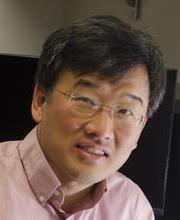Dennis Kim
R. Cannon Eley, MD Professor of Pediatrics

Our studies have spanned evolutionarily conserved pathways of innate immunity, the integrative physiology that connects infection and immunity with cellular and organismal responses to stress, and how interactions with microbes influence neuronal signaling and behavior of C. elegans. Starting with forward genetic approach to identify genes involved in pathogen resistance, we helped establish C. elegans as a simple animal host in which to study innate immunity and host-microbe interactions. We have made mechanistic connections between innate immunity and stress physiology—we discovered a physiological role for the Unfolded Protein Response in protecting the host against its own innate immune response, establishing a key role for the maintenance of endoplasmic reticulum homeostasis during activation of the innate immune response. We also studied genetic variation among wild strains of C. elegans, identifying natural polymorphisms affecting behavior as key determinants of host susceptibility to infection. In addition, we identified bacterial secondary metabolites that can alter C. elegans neuroendocrine gene expression, and we dissected the neuroendocrine circuitry that is modulated to influence host avoidance behavior. Our studies suggested that host organisms may detect virulence-associated secondary metabolites as cues of a “pathogenic state” to promote adaptive responses. We continue to bring a broad interdisciplinary perspective, experimentally grounded in the molecular genetics of C. elegans, to understanding how microbes can modulate the neuroendocrine physiology and behavior of animal hosts.
Contact Information
Boston Children's Hospital
Division of Infectious Diseases, Enders 761
300 Longwood Avenue
Boston, MA 02115
Division of Infectious Diseases, Enders 761
300 Longwood Avenue
Boston, MA 02115
p: 617-919-2900
